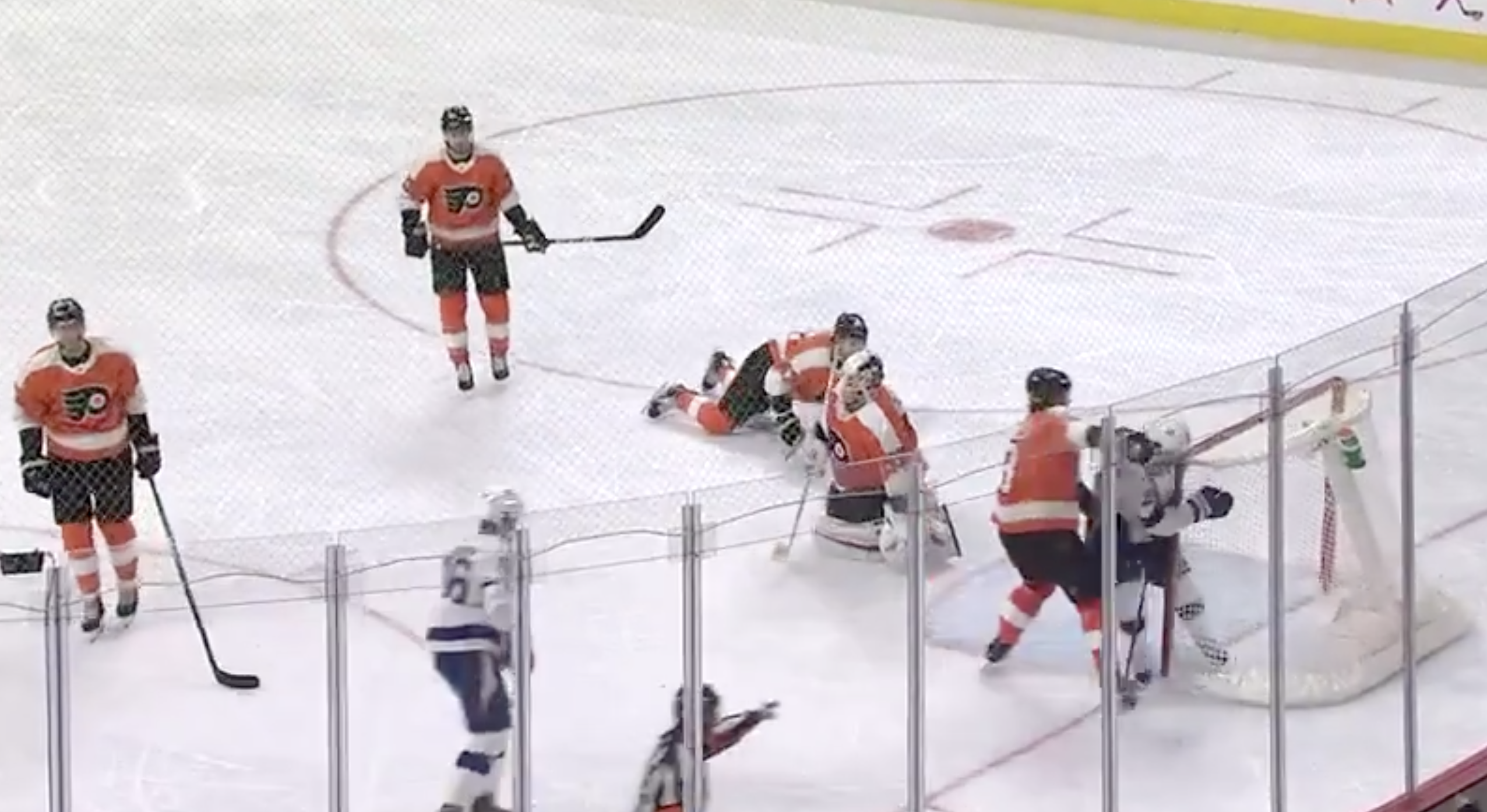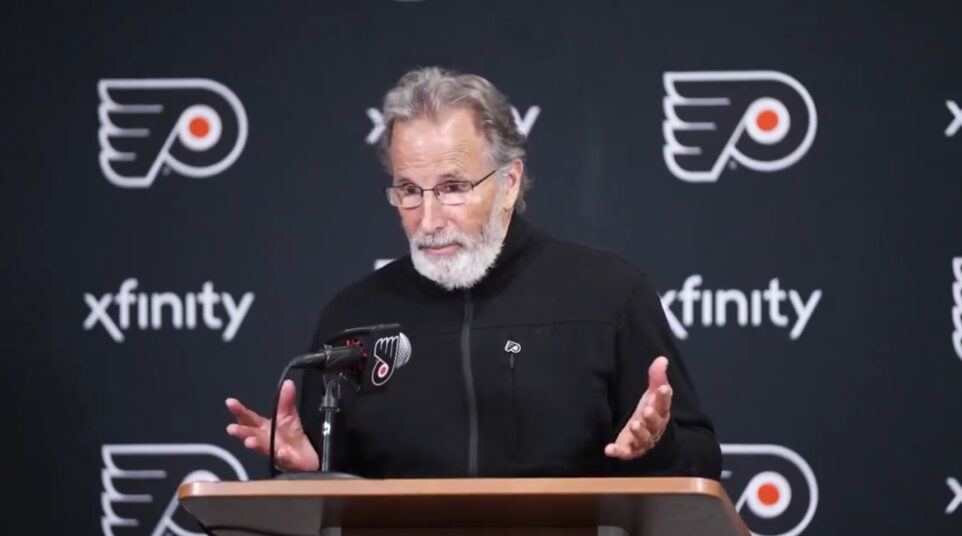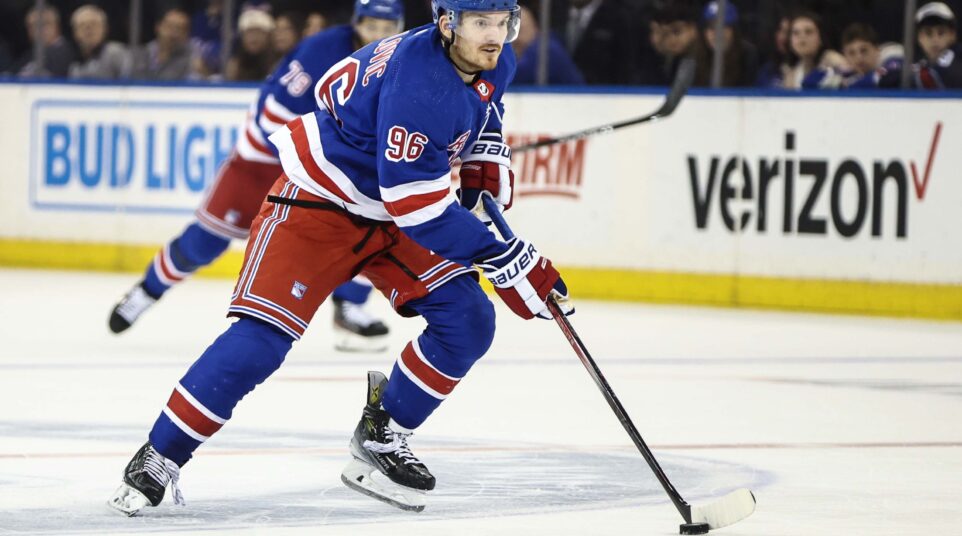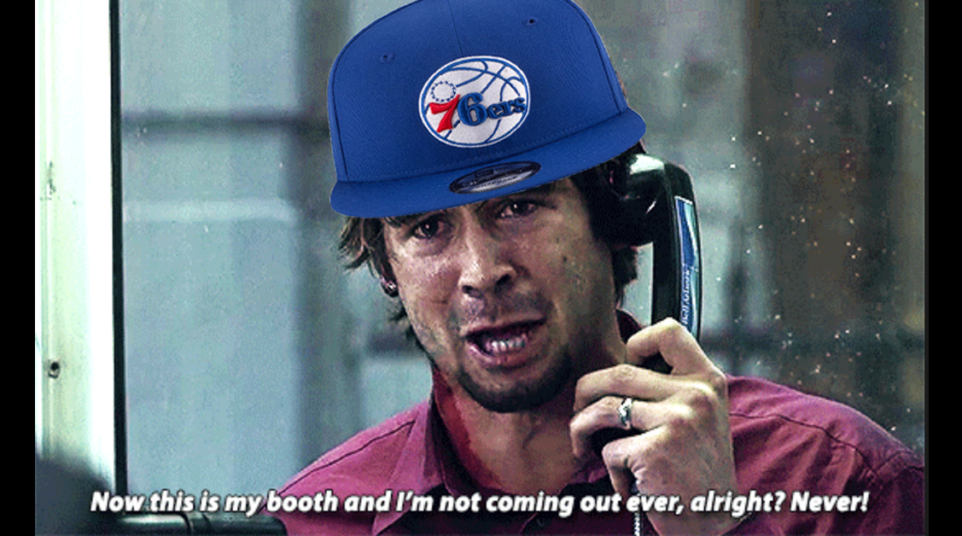
Maybe It's Not Better To Be Lucky Than Good: Lightning 6, Flyers 5
Shayne Gostisbehere was the only Flyer who was publicly honest about Saturday’s 6-5 overtime loss to the Tampa Bay Lightning:
“I mean we got a point out of it, but I don’t know if we had any business getting a point today.”
It’s always refreshing to hear blunt honesty. But the more disturbing thing is to hear the rest of his teammates – and his coach – wax poetically after this stinkburger of a hockey game about how well the team played and how there was solid effort and there are a lot of good things to build on.
Let’s break it down this way:
- The Flyers have now lost three-straight games after a 5-0-1 stretch got them back to respectability.
- All three games, mind you, have occurred on home ice, where the team has been dreadful this season.
- In the game itself, the Flyers penalty kill allowed three more goals in four shorthanded situations, and one was an abject mess of systemic hockey.
- There was a 22-minute stretch in the game where the Flyers were outscored 5-1. Most of that time was in the second period, and the coach, displaying great delusion, said, “Our first two periods were good periods. We came out of it on the wrong end of it. We have to do a little bit more. But our first two periods were pretty darn good periods.”
- For the record, it was 3-1 Tampa after two periods.
- The team is playing with two goalies who are no better than AHL level. With Brian Elliott out for at least two weeks and Michael Neuvirth occupying his customary place on injured reserve, the Flyers goaltending duo at the moment is Calvin Pickard and Alex Lyon. Lyon hasn’t been given a shot yet, but Pickard allowed six goals on 26 shots against Tampa and made no big saves when the team needed him.
- His goals against average is now 4.60 and his save percentage is .852. Both are the worst in the NHL among goalies who have played in at least five games this season.
- After allowing six more goals, the Flyers have the second-worst goals against average in the NHL (3.56) and have allowed the third-most goals in the league.
Yeah, really solid effort, boys.
Now, there were positives in the game. It’s not lost on me in this analysis that the power play – the much beleaguered and criticized power play – finally had a good game. The Flyers scored three power play goals. They hadn’t done that since last Jan. 4 against the Islanders – a span of 62 games.
They did badly outshoot one of the best teams in hockey significantly (45-26) and they did stage an epic comeback, scoring four goals in a span of 6:04 in the final 10 minutes of the third period, becoming only the ninth team in the history of the NHL to do so.
(It should be noted here that the NHL originally sent out a note saying it was the first time in league history that this happened. It was written everywhere in initial stories, so you might have seen it, but the league was wrong and later corrected that error).
And although Hakstol is off his rocker about the second period, and the players are fooling themselves with all the talk about playing a mostly good game and showing a never-say-die attitude in coming back the way they did, they did have an excellent first period. Despite not scoring, they showed they are a team that can feed off emotion, albeit sometimes that emotion takes them the wrong way – more on that in a minute.
Still, the mistakes continue to mount. The same deficiencies rear their ugly heads repeatedly and at the most inopportune times. And although there is talent here, and, at times the Flyers make you think they are turning the corner, they remain nothing more than inconsistent and mediocre. They are 9-9-2 at the quarter pole of the season. In the three previous seasons under Hakstol they were:
- 2015-16: 6-9-5 (17 points)
- 2016-17: 9-8-3 (21 points)
- 2017-18: 8-8-4 (20 points)
Notice a trend?
And here is an example of the worst trend about the Flyers:
That's a cool five goals in his last two games for Brayden Point, in case you were wondering.#TBLvsPHI | #GoBolts pic.twitter.com/3pjFWzFvgz
— Tampa Bay Lightning (@TBLightning) November 17, 2018
Not one player on the ice does anything right for the Flyers.
Yes, this is the penalty kill, so the Flyers are down a man. And yes, the Lightning power play is pretty damn good (they have seven goals in their last 11 opportunities over the past two games).
But that doesn’t excuse the complete lack of cohesion for the Flyers.
One by one:
- Why would Scott Laughton chase a hit there?
- Why is Dale Weise challenging the puck so high in the zone? If he can’t get there he creates way too much space for the Lightning to operate behind him.
- Why is Robert Hagg abandoning his position and getting himself caught in no-man’s-land? This puts undue pressure on his defensive partner…
- … Andrew MacDonald, who, when faced with pressure makes the absolute wrong choice and flops like a fish in a feeble attempt to block a pass.
- Pickard is just damn slow.
Why does this happen? Is this structural? Is this something you can blame on coaching? Maybe. Especially since the penalty kill has been a flaming pile of dung all season.
And maybe Hakstol should have used his timeout before this. The Flyers had just allowed a 5-on-3 power play goal to get behind 4-1, and it was the result of real frustration with the officials after two calls the Flyers didn’t like (one was definitely a penalty, the other probably wasn’t). It might have been a good time to just give his team an extra few seconds to breathe. Relax. Forget about the frustration. (Hey, maybe make a goalie change). All that is certainly true.
But that doesn’t excuse the Flyers from letting negative emotion impact them.
Maybe, instead of tanking this shift out of frustration, they play hard enough to allow that great comeback, and instead of just tying the game, maybe they pull one out with their comeback and steal two points instead of just one.
This is emblematic of a fragile hockey team. These are the things that happen to a team that lets itself get spooked into thinking the worst too often. This is completely on the players.
As for the comeback – was it really as good as it seems? I say no.
I mean, this was pretty cool:
Then Simmonds tied it all up at 5. pic.twitter.com/sO6sWyUvNE
— Broad Street Hockey (@BroadStHockey) November 17, 2018
This was the final goal in the comeback. It tied it at 5-5. Like I mentioned earlier, only eight teams have ever done this before – erase a four-goal deficit in the final 10 minutes. That’s quite awesome to see, no matter who the teams are that are involved.
And Simmonds was not going to be denied on this play. The Flyers were riding a big old wave of momentum and you could feel it in the Wells Fargo Center. It was nice to see the old barn rocking again, even for only a few minutes.
But how good really was the comeback? How much of it can really be attributed to the Flyers finding the intestinal fortitude to make an epic comeback? How much of it was really never-say-die?
Or was it just fortuitous?
Look, I’m not going to sit here and tell you it wasn’t impressive to score four goals so quickly. But I will also tell you that the Flyers really weren’t chasing this thing until it was 5-3. Then the level of play and the emotion and the energy ramped up.
Before that, I think the Flyers were accepting their fate of another home loss, and maybe they would score a goal or two and make it seem more respectable.
But Tampa really let the Flyers back into the game. They took two dumb penalties at a time in the game when they could have simply coasted to victory, and then their penalty kill seemed less than enthused to be on the ice in a four-goal game with less than 10 minutes to go.
They also didn’t get the same effort in goal from Louis Domingue that he gave through the game’s first 50 minutes.
And after Travis Konecny scored the first of his two goals, the Flyers didn’t seem that enthused. Even after Sean Couturier cut it to two, it was like, OK… that’s nice.
But it wasn’t until this moment…
First, Konecny made it a one goal game. pic.twitter.com/nvCsSxO4t5
— Broad Street Hockey (@BroadStHockey) November 17, 2018
…that the Flyers really turned on the juice.
So you see, it was only a really dominant effort by the Flyers once they got within two. Before that, they were resigned to the fact that they were going to lose. Don’t let anyone tell you otherwise. There was no notion they could pull this out until they were back within two.
It was a wild game for Konecny as well. Two goals is great, but he let his emotions get the better of him that lead to the first penalty in the third period sequence that saw Tampa stretch their lead to 5-1, and he was absolutely terrible on the second goal of the game by Tampa with his defensive effort in the second period:
Erne making moves, Ceddy cashing in. 🔥#TBLvsPHI | #GoBolts pic.twitter.com/BwrZ4Xj3mo
— Tampa Bay Lightning (@TBLightning) November 17, 2018
You just can’t be that lazy in your own end. Sorry. Nice finish for Konecny, but a disjointed effort all around.
As for Simmonds, It was great that he tied the game, but this play in overtime was brutal, and it’s why Tampa scored the game-winner:
Your @sonnysbbq goal of the game: A no-brainer. Cirelli’s unreal OT winner! #TBLvsPHI pic.twitter.com/Hxd50UniHw
— Tampa Bay Lightning (@TBLightning) November 17, 2018
He shattered his stick on the post after the goal in frustration. And his frustration was so great that he was “unavailable” (cough: refused to speak to the media) after the game.
So we don’t know publicly how he felt about the effort, but I’m betting he felt a lot like I described Gostisbehere at the beginning of this post.
The Flyers were lucky to get a point. And all this other poppycock about good play and grit is just that.
Simmonds and Jake Voracek (who also was “unavailable” after the game) used to be great guys to talk to after games, win or lose. Now, they don’t want to talk, ever.
Likely because they are as tired of the same-old Flyers story as the rest of us. Can you blame them?





